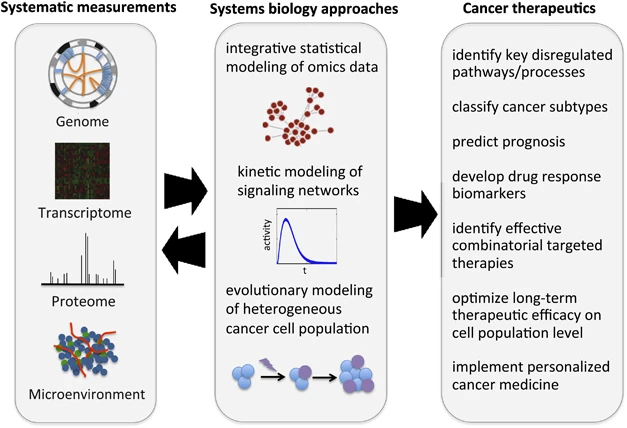Introducing SYBB 461: Cancer Systems Biology
We are excited to introduce our new course, SYBB 461: Cancer Systems Biology, offered this Fall 2024.
Course Overview
Cancer Systems Biology (CSB) is an interdisciplinary field that integrates experimental biology with computational and mathematical analysis to address the complexities of cancer. Unlike traditional approaches that focus on single mutations, CSB examines the entire cancer ecosystem, providing a holistic view of the genomic events that influence tumor behavior.
What You’ll Learn
In SYBB 461, students will explore a wide range of topics, including:
- Cancer Genomics and Epigenetics: Understand the genetic and epigenetic alterations in cancer and their implications for detection and therapeutics.
- Cancer ‘Omics: Dive into genomics, transcriptomics, and proteomics to analyze cancer data comprehensively.
- Bioinformatics Tools and Models: Learn to use fundamental bioinformatics tools, models, and algorithms to solve cancer-related problems.
- Spatial Multi-Omics: Explore cutting-edge techniques like spatial molecular imaging and sequencing-based spatial multi-omics mapping.
- Cancer Immunology and Microbiome: Study the role of the immune system in cancer progression and the potential of the microbiome in cancer therapy.
Unique Features
- Active Learning Approach: Engage in problem-based and active learning through hands-on assignments, in-class exercises, and a term project.
- Expert Knowledge: Benefit from guest lectures by leading experts in the field, providing insights into the latest research and developments.
- Comprehensive Assessments: Evaluate your understanding through quizzes, homework assignments, and a class project that involves real-world data analysis.
Course Logistics
- Instructor: Dr. Gürkan Bebek, Ph.D., M.S.
- Schedule: Mondays and Wednesdays, 12:45 PM – 2:00 PM
- Format: in-person
Why Enroll?
This course is perfect for students who have completed prerequisites in bioinformatics and are eager to apply their knowledge to cancer research. By the end of the course, you will have developed the skills to analyze large cancer datasets, understand the complexities of cancer biology, and contribute to innovative cancer research.
